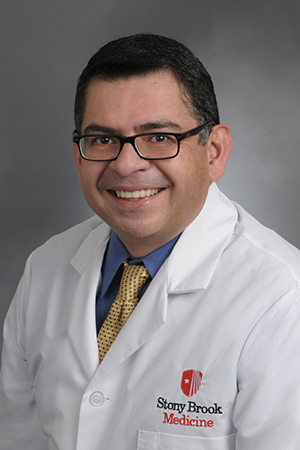Office
(631) 216-2904
Email
luis.martinez@stonybrookmedicine.edu
Stony Brook Cancer Center
MART Building, Room 9M-0834
Lauterbur Drive
Stony Brook, NY 11794
Research Program
Lipid Signaling and Metabolism in CancerDepartment
Department of PathologyResearch Interest
Dr. Martinez’s research is focused on understanding how alterations in the p53 gene contribute to the development of cancer. The wildtype form of p53 is a critical tumor suppressor gene that is frequently inactivated in human cancers. The majority of genetic lesions suffered by this tumor suppressor gene are missense mutations that disable its ability to block tumor development. However, these missense mutations can also give rise to mutant forms of p53 (mutant p53) that function as oncogenes that promote cancer progression through what is collectively referred to as gain-of-function (GOF) activities.
One of the primary areas of investigation in Dr. Martinez’s laboratory has been to determine the underlying mechanism(s) that permit mutant p53 to exhibit GOF activity. His laboratory discovered that mutant p53 is recruited to approximately 50% of its transcriptional targets through an interaction with the ETS2 transcription factor. Additionally, the work from Dr. Martinez’s laboratory implicated the mutant p53/ETS2 complex as a common mechanism by which different mutant p53 proteins are able to regulate the same spectrum of transcriptional targets. This fundamental mechanism has since been validated by other laboratories and appears to be the predominant mechanism by which mutant p53 controls the expression of any genes that mediate its oncogenic activity.
We have also established that mutant p53 can stabilize the ETS2 protein (and not other ETS family members), by disrupting its ubiquitin-mediated degradation. The stabilization of ETS2 by mutant p53 thus serves to amplify mutant p53’s ability to regulate gene expression by increasing the abundance of mutant p53/ETS2 complexes. Future studies are aimed at further dissecting how this transcriptional target regulates gene expression and how the interaction of mutant p53 with other proteins contributes to tumor progression.
Education
B.A., Biological Sciences, University of Texas at Austin, 1994Ph.D., Biology, University of Texas at Austin,1998


